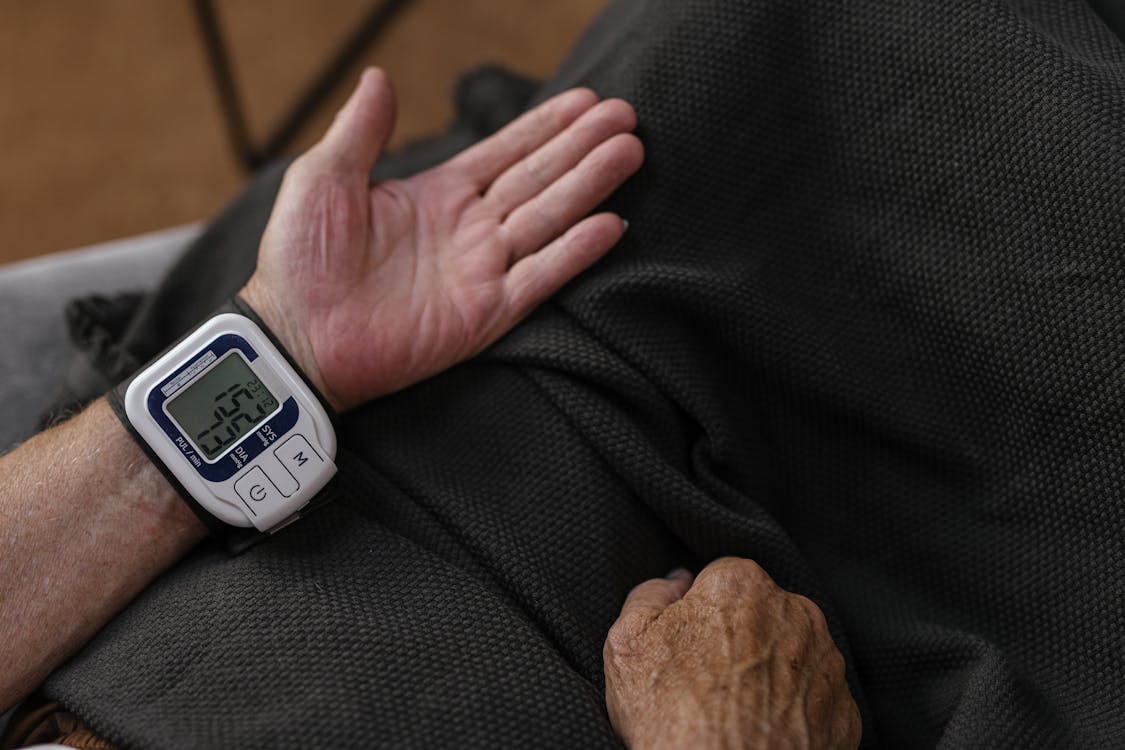About high blood pressure

High blood pressure, or hypertension, affects over a quarter of adults in the UK and is often referred to as the ‘silent killer’.1 This is because hypertension often presents few symptoms and frequently goes undiagnosed. Untreated hypertension can result in major cardiac events such as a heart attack or a stroke.2, 3
Whilst fatigue is probably not the most well-known symptom associated with high blood pressure, chronic tiredness can have a significant impact on your quality of life, so it is important to get it under control.
This article will explore the relationship between high blood pressure and tiredness, how to reduce your risk of developing high blood pressure and the related risk of fatigue.
How high is high blood pressure?
Your blood pressure is measured using two numbers, systolic pressure and diastolic pressure. Systolic blood pressure is the higher number of the two: it is a measurement of the force at which blood is pumped around the body by the heart. Diastolic pressure is the lower number and represents the resistance to blood flow in the blood vessels. Ideal blood pressure of a healthy adult is considered to be within the range of 90/60mmHg and 120/80mmHg.
Generally, high blood pressure is considered to be 140/90mmHg or higher. If you are over the age of 80, this changes to 150/90mmHg. It is important to note that everyone's blood pressure reading will be slightly different, and what is considered high for someone may be normal for someone else.
Blood pressure also fluctuates throughout the day; it starts to rise a few hours before you wake up and continues to rise to its peak at around midday. Blood pressure naturally begins to drop in the late afternoon and evening. However, if your blood pressure remains high over an extended period, you likely have hypertension.
Does high blood pressure make you tired?

Fatigue is a symptom that is sometimes associated with high blood pressure, and if you struggle with hypertension, you may have noticed that you sometimes feel tired for no reason.
When left untreated, high blood pressure can result in someone developing a range of serious health conditions, which may be the cause of their fatigue.
What causes high blood pressure?
High blood pressure develops over time, and your risk of getting high blood pressure is often increased by making unhealthy lifestyle choices. You may increase your risk of developing hypertension by:
- Not getting enough regular exercise
- Eating an unhealthy diet with too much salt
- Being overweight
- Excessive consumption of alcohol or caffeine-based drinks
- Smoking
- Having an irregular sleeping pattern
Age and family history are also important risk factors of hypertension as the risk of developing hypertension increases after the of 65, and you have a greater predisposition if you have a relative with hypertension.
Furthermore, it is estimated that in about 1 in 20 cases, high blood pressure occurs as the result of an underlying health condition or by taking certain medications.1
Some health conditions known to increase your risk of developing hypertension include:
- Diabetes
- Kidney disease, chronic kidney infections, and other less common kidney conditions
- Sleep apnoea
- Hormonal problems
- Lupus
- Scleroderma
Some medications that are known to increase blood pressure include:
- The contraceptive pill
- Steroids
- Non-steroidal anti-inflammatory drugs (NSAIDs), such as ibuprofen
- Some selective serotonin reuptake inhibitors (SSRIs)- antidepressants
- Some cough and cold medications
Certain recreational drugs, such as cocaine and amphetamines, are also known to increase blood pressure.
Complications of hypertension
Listed below are some complications of high blood pressure that may cause fatigue:
Coronary artery disease
Coronary artery disease can be caused by high blood pressure, which results in damage to your arteries and narrowing of the blood vessels. The consequential impairment to blood flow results in fatigue as a common symptom. Alongside tiredness, some other symptoms of coronary artery disease are chest pain, irregular heartbeats, shortness of breath and nausea.
Peripheral artery disease
High blood pressure can lead to the development of peripheral artery disease, where plaque builds up in peripheral blood vessels, causing them to become narrowed and limiting blood flow. Symptoms of this condition include numbness in the lower legs and feet, leg cramps, shiny skin on your legs and weakness/fatigue.
Kidney disease/failure
Hypertension can cause the constriction of blood vessels in the kidneys leading to tissue damage caused by reduced blood flow. This can often cause people to feel tired and experience weakness. If someone's kidneys become seriously damaged, they may go into kidney failure, which would require dialysis and possibly a kidney transplant.
Enlarged heart and heart failure
Your risk of developing an enlarged heart increases if you have high blood pressure.4 An enlarged heart does not pump blood as effectively as normal and therefore requires an additional input of energy. Sometimes an enlarged heart is asymptomatic, and other times people experience symptoms such as fatigue, dizziness, irregular heartbeat and shortness of breath.
What else could be making you tired?
Hypertension often does not display any symptoms, so tiredness associated with high blood pressure is likely caused by other contributing factors such as blood pressure medications, stress and sleep disturbances.
Common medications prescribed to lower elevated blood pressure levels, such as beta-blockers, list tiredness as a side effect. This is because these medications work by lowering heart rate, which limits the flow of oxygen around the body, resulting in feelings of fatigue.
Stress causes fluctuations in the levels of hormones in your blood, such as adrenaline and cortisol, which elicit the ‘flight or fight’ response. This makes your heart beat faster and constriction of blood vessels. This results in temporarily increased blood pressure.
However, if stress is chronic, it can worsen pre-existing hypertension or contribute to the development of high blood pressure. Stress can also have an adverse effect on other aspects of your health, which can exacerbate feelings of daytime tiredness. For example, stress can disrupt sleep and hormone levels, which are physiological changes that can lead to fatigue.5,6

Sleep disturbances such as insomnia have also been linked to an increased risk of developing high blood pressure. Sleep apnoea, another type of sleep disturbance, is a condition that causes breathing to stop repeatedly throughout the night. This condition has been shown to increase the risk of high blood pressure and also cause tiredness during the day.
Hence, poor sleep is one of the problems associated with elevated blood pressure and may cause fatigue during the day.
Can fatigue actually lead to high blood pressure?
Although fatigue is a symptom of high blood pressure, fatigue induced sleep disturbances can also be responsible for worsening hypertensive conditions.7 Sleeping for only 5 hours, or less, per night, may increase your risk of developing hypertension.8 If you already suffer from elevated blood pressure, lack of sleep may be making it significantly worse.
Other symptoms of hypertension
If you feel more fatigued than usual, it is important to check your blood pressure to identify any unexpected changes as there are often no noticeable symptoms of hypertension.
However, these are some important symptoms to look out for, and see your doctor if you experience any of these as it may indicate hypertension:
- Fatigue
- Lightheadedness
- Weakness
- Shortness of breath
- Chest pain or tightness
- Irregular heart rate
- Headaches or limb pain
- Difficulty performing daily physical activity
Preventing fatigue from high blood pressure
Preventing tiredness associated with high blood pressure starts by targeting the root cause. If you suspect your blood pressure medication is causing your fatigue, it would be advisable to book an appointment with your healthcare provider to discuss a treatment option that may work better for you.
Managing stress, and other factors that may be affecting your quality of sleep, will also help to reduce daytime tiredness. But most importantly, getting your blood pressure under control to avoid developing serious complications will help you combat health problems that may be causing you fatigue. Below are some ways you can manage your blood pressure and keep it under control.
Treating high blood pressure

After multiple consistently high blood pressure readings, your doctor is likely to make a diagnosis of hypertension. High blood pressure can often be managed by making some healthy lifestyle choices such as:
- Reducing sodium intake
- Eating a healthier diet
- Taking part in regular physical activity
- Not smoking
- Improving the quality of sleep
- Managing stress levels
- Reducing alcohol consumption
- Maintaining a healthy weight
If necessary your doctor may prescribe an antihypertensive medication to reduce your blood pressure. Some commonly prescribed blood pressure medications are:
- Beta-blockers - make your heart beat less rapidly and with less force, which causes less blood to be pumped through your blood vessels.
- Angiotensin II receptor blockers (ARBs) - reduce the narrowing of blood vessels.
- Angiotensin-converting enzyme (ACE) inhibitors - reduce the narrowing of blood vessels.
- Calcium channel blockers - allow blood vessels to relax, reducing resistance.
- Diuretics - removes extra water and sodium from the blood, reducing the fluid in blood vessels.
In cases where certain medications are causing an increase in blood pressure, such as the contraceptive pill or steroids, blood pressure should return to normal once you have stopped taking the medication.
Summary
In conclusion, there are multiple ways in which tiredness can be linked to high blood pressure. Excessive fatigue can significantly impact your daily quality of life, so it is important to understand the cause of the problem. If you suspect hypertension is the root cause of your tiredness, you should book an appointment with your healthcare provider to understand what may be the problem and discuss treatments that would work best for you.
High blood pressure can be effectively managed through improving your diet and exercise and occasionally by taking blood pressure medication. It is important to maintain a healthy lifestyle and keep your blood pressure normal, to look after the health of your heart and blood vessels.
References
- High blood pressure (hypertension). nhs.uk [Internet]. 2017 [cited 2022 Jul 3].
- Heart attack. nhs.uk [Internet]. 2017 [cited 2022 Jul 3].
- Stroke. nhs.uk [Internet]. 2017 [cited 2022 Jul 3].
- Enlarged heart [Internet]. [cited 2022 Jul 3].
- Ranabir S, Reetu K. Stress and hormones. Indian J Endocr Metab [Internet]. 2011 [cited 2022 Jul 3]; 15(1):18.
- Kalmbach DA, Anderson JR, Drake CL. The impact of stress on sleep: Pathogenic sleep reactivity as a vulnerability to insomnia and circadian disorders. J Sleep Res [Internet]. 2018 [cited 2022 Jul 3]; 27(6):e12710.
- Han B, Chen WZ, Li YC, Chen J, Zeng ZQ. Sleep and hypertension. Sleep Breath [Internet]. 2020 [cited 2022 Jul 3]; 24(1):351–6.
- Gangwisch JE, Heymsfield SB, Boden-Albala B, Buijs RM, Kreier F, Pickering TG, et al. Short Sleep Duration as a Risk Factor for Hypertension: Analyses of the First National Health and Nutrition Examination Survey. Hypertension [Internet]. 2006 [cited 2022 Jul 3]; 47(5):833–9.






